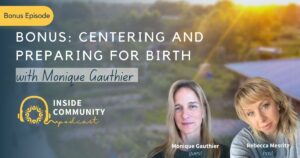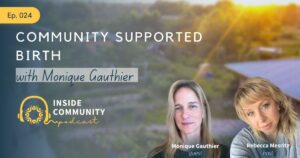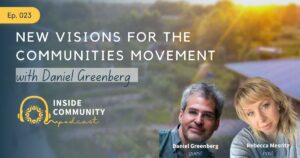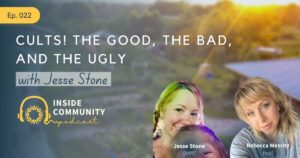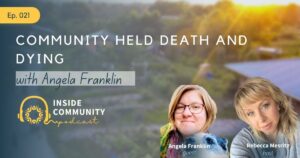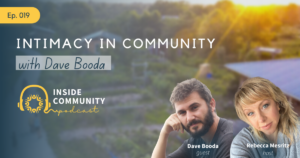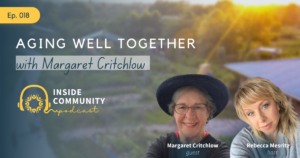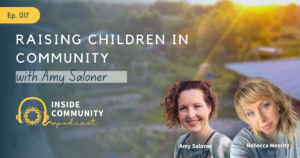What is Community? Fantasy vs. Reality
Inside Community Podcast — Ep. 001
Hello friends and welcome to the Inside Community Podcast where I bring you along for an inside look at what it takes to create and sustain community.
In this episode we are going to take a look at what we actually mean when we say “community.” This episode is going to cover a lot of the basics, but we will also get into some of the projections, fantasies and realities of what community is. So whether you are new to this topic or someone who’s been wondering if community is right for you… hopefully you’ll all find some useful nuggets here!
Follow the show and see inspiring images and video of community life on Instagram @InsideCommunityPodcast – I’d love to hear from you there! If this content has been meaningful or useful to you, please subscribe, rate and review on Apple Podcasts, and share with your friends and folks you know who are curious about living Inside Community. Your financial support of Inside Community helps us to continue to create meaningful and exciting content and I hope you’ll consider donating.
— Rebecca, your podcast host
Espisode Transcript
0:04
Hello friends and welcome to the Inside community podcast where I bring you along for an inside look at what it takes to create and sustain community. In this episode, we are going to take a look at what we mean when we say the word community. This episode is going to cover a lot of the basics, but we will also get into some of the projections, fantasies and realities of what community is. So whether you are new to this topic, or someone who’s been wondering if community is right for you, or if you’re someone who’s already actively trying to create or join a community, hopefully you’ll find some useful nuggets here.
0:53
People have been talking about community on the internet and social media before COVID at parties and transformational festivals. And it’s definitely been quite a buzzword for a while now, at least for the last 10 years. And I think it’s important for this podcast, that we established what we mean when we say community so that we can make sure that we’re all on the same page for these conversations. The foundation for intentional community, which is a wonderful organization that if you’re interested in community, I highly recommend checking out defines community as a group of people who have chosen to live together with a common purpose, working cooperatively to create a lifestyle that reflects their shared core values. Now, there’s a few key points in this definition. And the first one that I’ll touch on is that they’re really talking about residential and land based community, a place where people actually live together. And this is by no means to diminish online communities or communities that come together around sports or religion, or a hobby or shared interest. But what I’m really talking about for this podcast are human settlements. So places where people actually live together either in a shared house a cohousing development, or, in my own example, for the last 10 years as a group of people that live in different houses, but we live together on the same land that is held in common or a combination of these things. Now, there are a lot of different ways to own land and hold land. And we will definitely get into some of that. But for now, just want to establish that we’re talking about community as a place where people live together. Another kind of key differentiator around the community topic is that of intentional community. And I have to laugh because when I’ve talked about intentional community in the past over the years, I definitely have gotten some sideways looks from folks who think it’s pretentious to talk about intentional community, as if it’s somehow denigrating the other types of community. And there are definitely some aspects of intentional community that kind of creates that preconception. And there’s also some highfalutin, pretentious folks that live in intentional community, just like there are in the rest of the world. There’s also a lot of assumptions about intentional community when I talk about intentional community that, oh, it’s a cult, or it’s a hippie commune or that it’s some kind of polyamorous or swinger community. And I’m going to admit, sometimes it is those things, and people will identify that they’re living in an intentional community. And it will also be a cult or it will also be a polyamorous community, or it will also be a hippie commune. And those are just all different choices that different types of intentional communities make about how they’re going to function and how they’re going to operate. But not all intentional communities are those things. intentional communities are like individual people, each one has a different focus a different place where they’re putting their energy, a different way of structuring themselves or organizing themselves. And so there’s not really one type of intentional community, they’re all very, very different. I’ve also heard people kind of respond when I talk about intentional community about oh, as opposed to unintentional community, and yes, as opposed to unintentional community, and unintentional community, for me might be something like a college dorm or just a single family home in a regular neighborhood, where you buy into that neighborhood, you buy your house, because you need a place to live. And there’s a house available and maybe you like the school, but it’s not Not necessarily with the intention of building something specifically with your neighbors. And I say this not in any way to diminish the amazingness. And potential of those experiences. I think if there’s anything that we’ve learned from this time of COVID, and extreme weather events and polarization in the government, it’s that we really now more than ever need each other to survive. And there are a lot of opportunities inside of these unintentional communities to make them more intentional, to lean into your neighbors to share resources, to celebrate together to share meals together, and be really just beautiful and resilient communities within a community. And it is my deep hope that the world over communities begin to do that more.
5:58
But in terms of specifically intentional communities, it’s important to make the differentiation that in an intentional community, people are living together with a deeper held and shared intention. They’re coming together around a shared value, and to achieve a shared vision. An easy example that most people have heard of would be the case of an eco village, where people are coming together to develop technologies and practice living in a way that’s more sustainable, more mindful of the environment, and actually working in harmony to regenerate or rebuild the soil, for example. But those communities could be coming together around spiritual practices, or businesses, social justice, or even just a profound desire to live with people that you’re going to grow together and engage in deeper levels of intimacy. And many communities are working on several different types of initiatives at once. And this is one of the things that I find personally, so exciting about the intentional communities movement, is that really, each community is working on their own unique piece of figuring out how we as humans can live together better, more effectively and in greater harmony. And to that end, different communities are exploring all different aspects of this. Some might be, for example, exploring different ways of engaging with finance, and in one community that might be developing their own currency. And another might be using a bartering system. And another might be developing different ways of income sharing or community business building. And so each of these different communities might have different models that it’s practicing and trying out. But with a similar long term vision or goal of developing novel practices around finance. Another interesting thing that intentional communities do is to experiment with different types of decision making models and governance, governance being the way that groups organize, manage themselves, and basically just make sure that they get things done. When you have a group of people coming together with a mission and a vision that they’re trying to accomplish, they usually need structure to be effective, and they need to decide how they’re going to make decisions. Just like in any business or corporation or nonprofit, there has to be some agreements about how those things are going to happen. Many communities opt for non hierarchical structures, which is very different from what most of us are used to in, in the regular world and the default world. We generally participate in governments, which for better or worse, there’s someone in charge, and there’s people below them and people below them. Power trickling down in the best of cases, or just concentrated with the few in in let’s face it most cases. There are communities that operate this way with a benevolent or sometimes not so beloved, benevolent leader, owner founder calling the shots. But a lot of communities, particularly intentional communities, are using more novel approaches to governance like holacracy, or sociocracy. And they’re also exploring different types of democracy consensus or consent decision making, to make their agreements. And future episodes, we’re definitely going to come back to some of these things and talk about them in more detail, because it is such a awesome part of what happens in community and it’s something that I’m really passionate about and really interested in. But for those of you who are looking into joining or quitting Reading community this isn’t this is definitely an area that you’re going to want to dive deeply into. And then there’s the deepest and most personal levels of work. As cohousing advocate, Zeff pace would say, it’s the longest and most expensive personal growth workshop you’ll ever take. This is really the juicy bit for me, because I see intentional community as an exceptional laboratory for personal development, interpersonal and relationship work and conflict resolution. It’s really the place where I have found over the years, the most opportunities for accountability and reflection.
10:49
And it’s really these last two topics that I’ve touched on the personal growth aspects and then governance aspects of community that bring me to the title topic of this episode, which is fantasy versus reality of community. A lot of people are drawn to the idea of community, because of their ideals and their values. They want to live in the world of their dreams, and they want to be part of creating that reality. They find people who have shared values, and they say, Let’s go for it. And that spirit is amazing. That is absolutely a piece of what brought my community together. And I will say that after 10 years, I absolutely love living an intentional community. And I wouldn’t want to live and can’t conceive of living any other way. It’s amazing. And it’s a lot of work, folks. Particularly if you are talking about starting a new one, a new community. It takes an incredible amount of lifeforce initiatory force to get something like a community going. It takes organization, financial resources, and savvy relational skills, usually design and building skills. It takes communication, it takes deep listening and a willingness to be deeply seen and a held accountable. There’s lots of wonderful celebrations, delicious food, and play and dance. But it is certainly not all that. This can be a really challenging part for people who are new to community, who are fleeing the default world, and ideas of the man. And because of the trauma of the default world of nine to five jobs and bosses, school and taxes, places where they feel like their personal power and autonomy have been stripped away and denied. They are coming to community adverse to structures. And they’re seeking a utopia, where people just sort of spontaneously do what’s right. People just do what needs to be done. And everyone’s living their bliss and communicates kindly and supports each other. And it’s a beautiful fantasy. But it’s the difference between a Cinderella story and a real life relationship. If you’ve ever been in a long term relationship with someone, you might remember the beginning when you were just kind of gaga for each other. You’d spend long nights talking on the phone or gazing at the stars or into each other’s eyes, and talking about a future amazed at how aligned all your visions were. Or maybe you saw your partner as the prince or princess charming, riding in on a steed and saving you from whatever situation you needed saving from. But we all know where this goes at some point you begin to see the reality that not every vision was as aligned as you thought and maybe they weren’t as perfect as you thought. And that’s when the real love and the real work begins as you start to uncover the truth of who that other person really is after the fantasy. And maybe you start to uncover that it was you that was not as perfect as they thought. But isn’t that the beauty of the long term love is that you love each other through the imperfections. Now imagine this scenario, but with 25 or 75 or 150 people that you live with. When we’re dealing with real people, not fantasy people, we need real agreements, structures, ways of dealing with conflict and trauma so that we can create safety and actually get things done. We’re coming together around a shared vision and a vision for a more beautiful and better world. But in order to be able to create that, we need to have some structure as a foundation. When I meet people who are all starry eyed and idealistic about community, I actually try to talk them out of it well, at least a little bit, because it really is a lot of work. And I don’t just mean physical labor of barn raising and building things. But I mean, it’s deep inner work, your deepest fears around money around survival, around acceptance, and worthiness, all get to be brought to the surface, and community. And most people really only ever dream about community for this reason. Because once it comes time to pull the trigger, or purchase the land, or sign the documents, all of the sudden a lot of those deeper things come up to the surface, and people sort of run out the door.
16:05
But if you really, really want it, and you’re willing to work for it, and you weren’t willing to work at it, there’s nothing I can think of that is more rewarding. And so this really is the difference that I see between intentional community, and most other types of community. In the default world, there are a lot of backdoors, there’s a lot of outs, it’s pretty acceptable to look out for number one to make sure that you and your own family are cared for first. When there’s conflict, it can be pretty easy just to walk away, and decide that you’re not going to engage with that person anymore with that institution anymore. And shirk responsibility. If you’ve made a mistake, there’s generally not a lot of notice, when you pass the buck. An intentional community however, there is a heightened level of accountability and witnessing those 2570 550 people that you are now living with are your mirrors. While there should always still be a way to claim solitude when you need it, daily life and community leaves little opportunity for hiding out. When you’re having a bad day or a rough moment, people know it. And you get a chance to see other people and their deepest processes as well. It can be painful to realize that what you thought community was and how people would be and the kind of support you assumed there was. And all of that was just a bit of a fantasy. The big visions for the new and improved world that you and your tribe will create. And all the advancements in various technologies are actually orbiting around the very real people that make up the community. It’s it’s actually kind of funny, because frequently, community comes together thinking that they’re there to work on those things, the environmental issues, the new commerce, the meditation practices, but really, they’re just they’re working on themselves. And isn’t that kind of true for all of life in the end anyway. But the reality is, is that there’s a lot of opportunity inside of community to see that for what it is. And that through shattering these fantasies, there’s a rich space, to move into love and acceptance of yourself and others.
18:33
The process of building a life with other people taking their needs into account is equally as your own. Being willing to claim the fact that you are not perfect and are going to make mistakes and sometimes really nasty ones and are going to have to take accountability for yourself is really at the heart of what community is. And it’s also the surprising ways that people show up for you that you weren’t anticipating the ways that you get to receive support and reflection that you never in your wildest dreams could have imagined. There’s a lot that will need to be let go of in order to thrive and community, a lot of old stories and ideas about how things are supposed to be. But as that personal work gets done, the ability to be more effective in landing that grand vision that ideal. That intention that brought you together in the beginning will increase exponentially. And that’s the reality of what you’re doing an intentional community thank you so much for joining me for this episode of the inside community. Podcast. If you liked what you heard, and you found it helpful, please take a moment to rate review and share it with your friends. We’ll have new episodes coming out every couple of weeks. So subscribe so that you can be the first to know about the new ones that are coming out. And if you want to see more about what it’s really like to live inside community, come find me on Instagram at inside community podcast. I would love to hear from you and learn more about how I can inspire you on your journey to live inside community.
Recent Episodes
- Bonus: Centering and Preparing for Birth with Monique Gauthier
- 024: Community Supported Birth with Monique Gauthier
- New Visions for the Communities Movement with Daniel Greenberg
- Cults! The Good, the Bad, and the Ugly with Jesse Stone
- Community Held Death and Dying with Angela Franklin
- Central Leader Communities with “Evil Dictator” Paul Wheaton
- Intimacy in Community with Dave Booda
- Aging Well Together with Margaret Critchlow
- Raising Children in Community with Amy Saloner

About the Show
The Inside Community Podcast brings folks along for an inside look at all of the beautiful and messy realities of creating and sustaining a community. We provide useful and inspiring content to support people on their quest for resilience, sustainability, and connection.

Meet Your Host
Inside Community Podcast host Rebecca Mesritz is a community builder living in Williams, Oregon. In 2011, Rebecca co-founded the Emerald Village (EVO) in North County San Diego, California. During her ten years with EVO, she supported and led numerous programs and initiatives including implementation and training of the community in Sociocracy, establishment of the Animal Husbandry program, leadership of the Land Circle, hosting numerous internal and external community events, and participation in the Human Relations Circle which holds the relational, spiritual and emotional container for their work.
In June of 2021, with the blessing of EVO, Rebecca and 3 other co-founders relocated to begin a new, mission- driven community and learning center housed on 160 acres of forest and farmland. Rebecca is passionate about communal living and sees intentional community as a tool for both personal and cultural transformation. In addition to her work in this field, she also holds a Master of Fine Arts degree from San Diego State University and creates functional, public, and interactive art in metal, wood, and pretty much any other material she can get her hands on. She is a mother, a wife, an educator, a nurturer of gardens, an epicurean lover of sustainable wholesome food, and a cultivator of compassion and beauty.

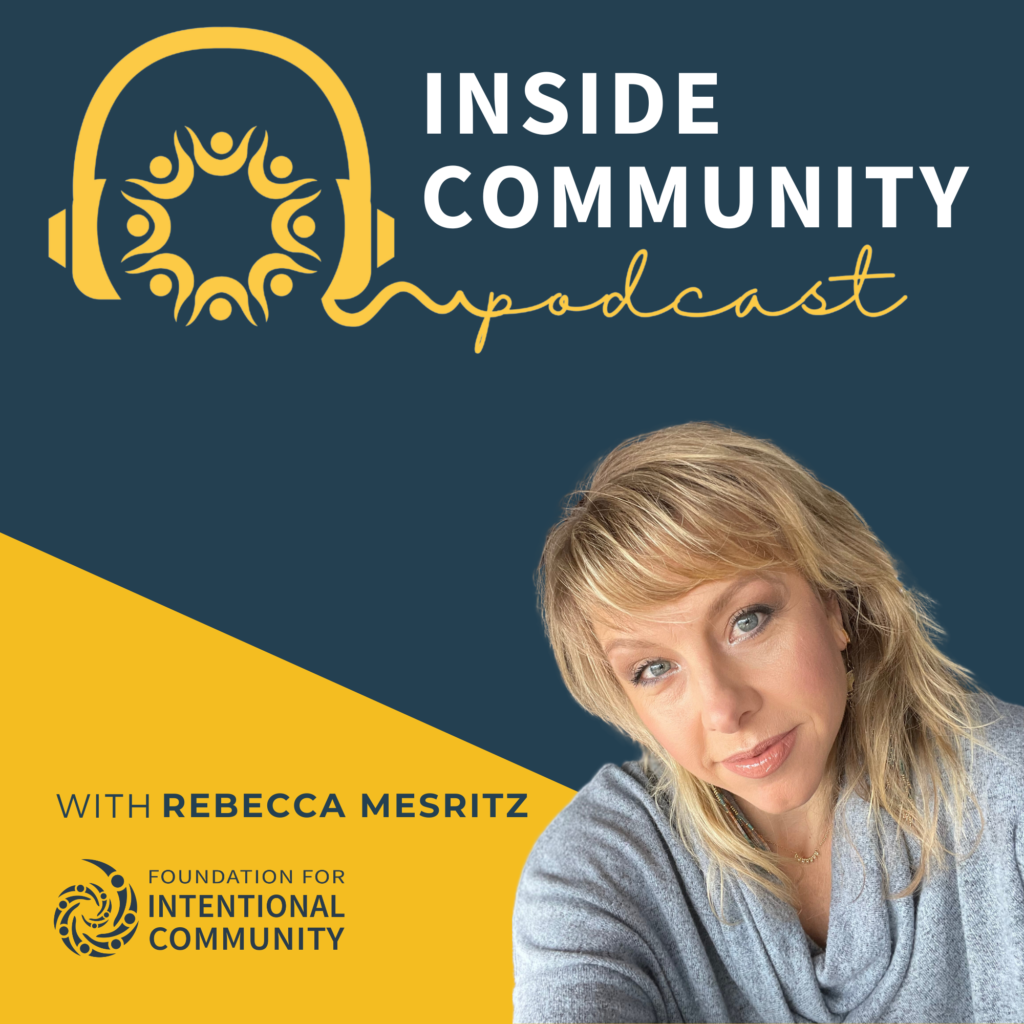
The Inside Community Podcast is sponsored by the Foundation for Intentional Community (FIC). Reach out if you are interested in sponsorship or advertisement opportunities on the podcast.






